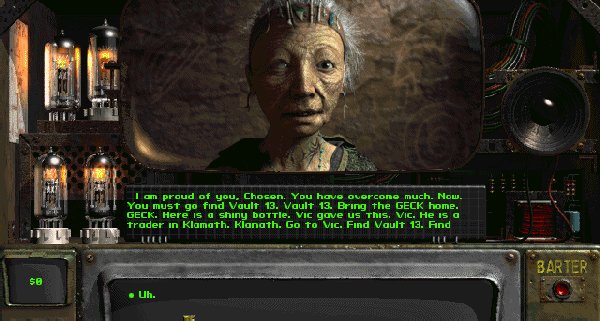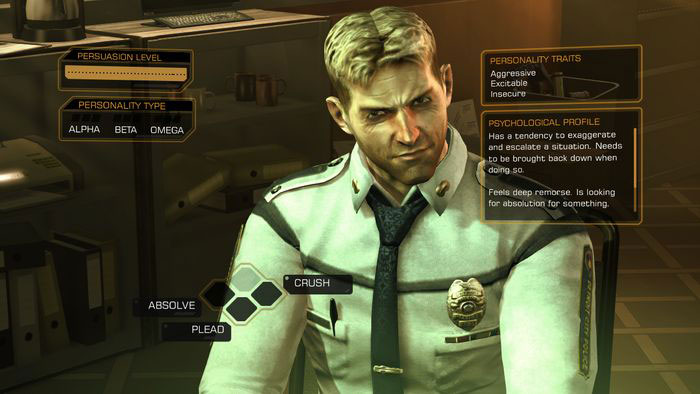About the Deus Ex dialog system and real mechanics in board games
Deus Ex Human Revolution - a work of art in the best traditions of cyberpunk, a kind of IT-RPG. The game is excellent and stylish with a cool storyline and a lot of elaborate details. But the most, in my opinion, cool in it is a system of dialogues as a mechanic.
I'll explain what's the matter. Look at these two screenshots: the first one from Fallout II, the second one from the new Deus Ex.

Good old conversational system
')

Dialogue in Deus Ex with a social module installed in the head
The classic dialogues in both Fallout II and Deus Ex are very similar: you just have to choose the answer options. In both cases, if you want to convince the interlocutor, you need to think through a line of conduct. It is possible to press on someone, apologize to someone, tell someone directly and so on.
The interesting thing is if you get a social perk in Fallout or install a social module in Deus Ex. In the first case, the dialogues will not change, but all the answers will be highlighted in colors: blue - like your opponent, red will infuriate him and so on. Everything is simple and no extra knowledge is needed.
But in Deus Ex everything is steeper. Here you do not give the right or wrong branches. You see the character's character fluctuations (alpha-beta-omega) during the dialogue, plus from time to time respiratory activity and pupil activity are shown using special diagrams. Plus profile and character traits. Then you need to use this information.

Social module determines the reaction of "alpha" by heartbeat
What changed? First, you see how the data is collected. You preliminarily “calibrate” the interlocutor, scouting for his microreactions the type of character and modus operandi. And then you decide on how best to influence - which particular strategy. At the same time, the module creates new dialogues (branches that would not exist without it), but does not change the results - in most cases the same could be achieved simply by choosing the right options in the usual way.
And now the coolest. This means that the player receives a tool that allows you to evaluate the actions yourself. That is, it is not the game that does it for him as in the second Fallout, but the player himself uses his personal knowledge.
What is the result? Deeper dive. Spectacular dialogues (in the game world - a person speaks, and you study his breath with the help of sensors, on the screen there are insanely beautiful drawings of light diagrams). Then - the solution. At the level of mechanics - showing a number of signs, from which it is necessary to catch the supporting ones and make a choice. At the setting level, a completely holistic system with which it is interesting to interact.
Now imagine that the game would not interpret this data for you (as it is now reflected in the character plot). And the player would have to rely on his own knowledge of psychology: what suddenly the opponent breathed faster, why the pupils dilated, why he reached for a cigarette, why the voice got higher and so on.
The game could give a solid simulation of a real dialogue (now it is almost achieved), and the player would feel that his knowledge of psychology is important for its correct conduct. Another thing is that creators must be competent enough to prescribe this.
But if you do this, we fall out of the game plane into the plane of interaction with real objects. In our example, the problem cannot be solved by game methods - you need a real player skill that cannot be “shaken” in the game. At first glance, it gives away some hardcore-like drawing a map on paper instead of a convenient autocard in the game;
But at the same time, games have already had math problems for a long time (real math is needed) and other attempts to use real skills.
The fact is that in our board games there is a sea of everything that requires interaction outside the plane of the game. There are many examples: from simple skill games like Medved (where you need to grab a log for speed, and the advantage is a person with a better reaction) to classical diplomacy in strategies, where the advantage is more prepared for the impact. And, of course, it is worth mentioning the Mafia and the Resistance, where all-all-all things in the game are built around the ability to negotiate players. That is, mechanics boldly climb into the real world and work there. The reaction and behavior of the players is still as easy to predict. That is, such outputs for the plane of the game itself - the norm. Moreover, every second game is almost initially designed for casuals, that is, deep special training is not required.
From counterexamples, I recall how two Japanese were immediately disqualified for having determined at the MTG tournament who would be the first to walk, running up to the wall of the hall. The first came running - the first to go. The reason - “unsportsmanlike behavior” - the more physically prepared one had an advantage.
Returning to the dialogue system. In my opinion, in Deus Ex there is something magical and new. At least in its rudimentary form.
PS Yes, and the game is good and very atmospheric. If not seen - I advise. Just do not kill yourself working days.
I'll explain what's the matter. Look at these two screenshots: the first one from Fallout II, the second one from the new Deus Ex.

Good old conversational system
')

Dialogue in Deus Ex with a social module installed in the head
The classic dialogues in both Fallout II and Deus Ex are very similar: you just have to choose the answer options. In both cases, if you want to convince the interlocutor, you need to think through a line of conduct. It is possible to press on someone, apologize to someone, tell someone directly and so on.
The interesting thing is if you get a social perk in Fallout or install a social module in Deus Ex. In the first case, the dialogues will not change, but all the answers will be highlighted in colors: blue - like your opponent, red will infuriate him and so on. Everything is simple and no extra knowledge is needed.
But in Deus Ex everything is steeper. Here you do not give the right or wrong branches. You see the character's character fluctuations (alpha-beta-omega) during the dialogue, plus from time to time respiratory activity and pupil activity are shown using special diagrams. Plus profile and character traits. Then you need to use this information.

Social module determines the reaction of "alpha" by heartbeat
What changed? First, you see how the data is collected. You preliminarily “calibrate” the interlocutor, scouting for his microreactions the type of character and modus operandi. And then you decide on how best to influence - which particular strategy. At the same time, the module creates new dialogues (branches that would not exist without it), but does not change the results - in most cases the same could be achieved simply by choosing the right options in the usual way.
And now the coolest. This means that the player receives a tool that allows you to evaluate the actions yourself. That is, it is not the game that does it for him as in the second Fallout, but the player himself uses his personal knowledge.
What is the result? Deeper dive. Spectacular dialogues (in the game world - a person speaks, and you study his breath with the help of sensors, on the screen there are insanely beautiful drawings of light diagrams). Then - the solution. At the level of mechanics - showing a number of signs, from which it is necessary to catch the supporting ones and make a choice. At the setting level, a completely holistic system with which it is interesting to interact.
Now imagine that the game would not interpret this data for you (as it is now reflected in the character plot). And the player would have to rely on his own knowledge of psychology: what suddenly the opponent breathed faster, why the pupils dilated, why he reached for a cigarette, why the voice got higher and so on.
The game could give a solid simulation of a real dialogue (now it is almost achieved), and the player would feel that his knowledge of psychology is important for its correct conduct. Another thing is that creators must be competent enough to prescribe this.
But if you do this, we fall out of the game plane into the plane of interaction with real objects. In our example, the problem cannot be solved by game methods - you need a real player skill that cannot be “shaken” in the game. At first glance, it gives away some hardcore-like drawing a map on paper instead of a convenient autocard in the game;
But at the same time, games have already had math problems for a long time (real math is needed) and other attempts to use real skills.
And here it is appropriate to look at the desktop
The fact is that in our board games there is a sea of everything that requires interaction outside the plane of the game. There are many examples: from simple skill games like Medved (where you need to grab a log for speed, and the advantage is a person with a better reaction) to classical diplomacy in strategies, where the advantage is more prepared for the impact. And, of course, it is worth mentioning the Mafia and the Resistance, where all-all-all things in the game are built around the ability to negotiate players. That is, mechanics boldly climb into the real world and work there. The reaction and behavior of the players is still as easy to predict. That is, such outputs for the plane of the game itself - the norm. Moreover, every second game is almost initially designed for casuals, that is, deep special training is not required.
From counterexamples, I recall how two Japanese were immediately disqualified for having determined at the MTG tournament who would be the first to walk, running up to the wall of the hall. The first came running - the first to go. The reason - “unsportsmanlike behavior” - the more physically prepared one had an advantage.
Returning to the dialogue system. In my opinion, in Deus Ex there is something magical and new. At least in its rudimentary form.
PS Yes, and the game is good and very atmospheric. If not seen - I advise. Just do not kill yourself working days.
Source: https://habr.com/ru/post/191612/
All Articles